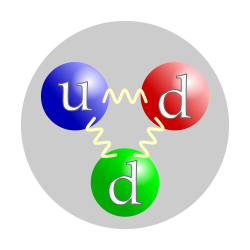Question #8b42e
1 Answer
Mostly not possible.........................
Explanation:
This is a very hard question and I think no one could solve this question because this is listed in the list of unsolved questions in physics.
Free neutrons are unstable with a half life of 10 minutes,11 seconds .It decays via beta decay
Beta Decay
Beta decay is a very complicated process and involves one of the fermions,upp quarks and down quarks
As you must know a neutron is made 2 down quarks and 1 upp quark

A free neutron is not stable. The upp quark in the neutron get converted into a down neutron and a W boson. This can be represented in an equation
Obtaining from this equation
This means the weight of W boson
Mass of upp quark = 2.15 mega electron volts
1
=
c is speed of light
We know the energy calculate the mass
Calculate x
Some others say 2.4572e-22 kg
- "mass of down quark" #
The W boson later decays to form an antineutrino and a electron

So you can say neutrons can't say stable.After 2 neutrons being bonded there are no trineutrons nor tetraneutron and Pentaneutron.

